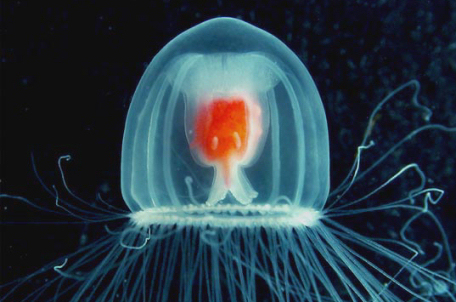This is amazing, I just found out that immortality does exist. Turritopsis Nutricula is a hydrozoan and considered by scientist to be the only living creature that can cheat death . This creature has the ability to reverse or forward ageing.
Usually, Jellyfish has only a lifespan of a few hours to a few months, and some can live for years. But this kind of Jellyfish called Turritopsis Nutricula is the king of them all, it can live forever. Just like every other living creature, this Jellyfish can grow old, but they have a unique ability to reverse this process and grow young again. Of course this kind of creature also has an end because they are just around 1/5 of an inch in diameter on their bell, so they can be an easy prey for other animals, unless no one eats them, they won't die.
More Factoids about Jellyfish
[source: http://www.zmescience.com]
- It isn’t just fully grown Turritopsis Nutricula that can revert back to the polyp stage. At any point from the time they emerge from a polyp to being fully mature, their bodies can revert back to the polyp stage if environmental factors warrant it.
- Jellyfish sting you through nematocysts. Nematocysts are tiny spine covered tubules. The spines anchor themselves in your skin and when the nematocysts fire, various chemicals are injected into you. In some cases, you may have literally thousands of these nematocysts attached to your skin after being stung by the jellyfish.
- Even after the jellyfish is dead, they can discharge nematocysts, sometimes even days after the death of the jelly, which is why you should be careful playing with a dead jellyfish on a beach.
- If you’re stung by a jellyfish, a good remedy for this is to pour vinegar on the area stung, which will neutralize the nematocysts. The exceptions to this are if you got stung on your eye (you shouldn’t put vinegar in your eye) or you were stung by a Man o’ War (vinegar will make their stings worse).
- You should never wash the sting with fresh water as it can change the tonicity, causing the nematocysts to fire, injecting more chemicals into you, which obviously makes the problem much worse. For the same reason, you should NOT apply ice or urine to the affected area. Rather, if no vinegar is available, you should rinse it with salt water, then use a knife, razor, credit card, etc. to very gently scrape (don’t use very much pressure or it will cause the nematocysts to fire) the area stung to get rid of any remaining nematocysts before they fire and make the problem worse. Finally, dry the area off as best you can without using too much pressure. Taking an antihistamine, such as Benadryl, will also help.
- Jellyfish can be found in every ocean and there are even certain kinds of freshwater jellyfish, though these don’t sting. It is thought jellyfish first came into being around 500-700 million years ago, making them the oldest of all multi-organ living things on Earth.
- Because jellyfish are not actual fish, many institutions, such as public aquariums have settled on referring to them non-scientifically as “jellies”, rather than jellyfish.
- A group of jellies is called a bloom or a smack. Blooms as large as around 100,000 jellies have been observed.
- The majority of jellies do not have what we would consider a brain. Rather, they simply have a network of nerves which allow them to respond to various things in their environment. However, it should be noted some not only possess a brain, but actually have multiple brains. For instance, the Box jelly has four brains that act in parallel with one another. They also have 24 eyes, including two eyes that have a cornea and a retina and which are able to see colors.
- What type of jellyfish is the largest in the world depends on one’s definition of “largest”. That being said, two of the main candidates are the Lion’s Mane jellyfish, which can grow tentacles up to 120 feet long, and the Giant Nomura Jellyfish, whose bell can grow as big as 7 feet in diameter (about twice as big as a Lion’s Mane Jelly) and can weigh as much as 440 pounds.





